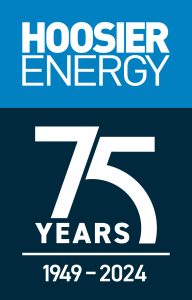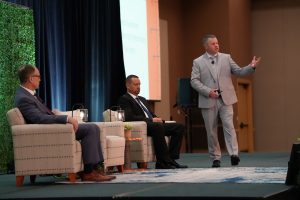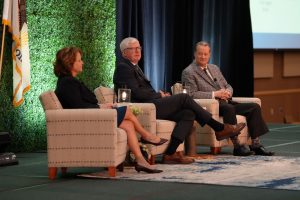A video greeted arrivals at the 2024 Hoosier Energy Annual Meeting with pictures from the past and a 75th anniversary logo in the lower right corner.
 One might have expected that would mean the annual event at the French Lick Resort would spend time looking back to see how far Hoosier Energy had come.
One might have expected that would mean the annual event at the French Lick Resort would spend time looking back to see how far Hoosier Energy had come.
That was not the case. Instead, the next five-plus hours were spent looking to the future to see how far Hoosier Energy might yet go.
It was a fitting approach to the theme of Cooperative Resilience, as Hoosier Energy President and CEO Donna Walker explained in her introductory remarks by referencing the different stages of the Industrial Revolution in the mid-1700s, mid-1800s and mid-1900s.
“Then the pace picked up,” she said. “This time there was a difference, a shift not just in energy itself but with the growth and acceleration of digital technology.
“… What we’re seeing now is this virtual world merging into our physical world. The energy transition is really a major part of this much broader societal transformation taking place.”
That increased pace of change makes resilience a necessity, but Walker said the longevity of the cooperative model and of Hoosier Energy itself is all the evidence anyone needs.
Citing studies that show fewer than 12 percent of businesses are more than 26 years old and only half of one percent make it to 100 years, Walker noted that with 75 years in the books and wholesale power contracts with members through 2060, Hoosier Energy is poised to easily surpass the 100-year mark.
“I think that’s proof enough our cooperatives are indeed resilient when it comes to tackling difficult decisions and handling conditions that are often outside of our direct control,” she said.
Among those conditions are financial and economic factors, which was what guest speaker Andrew Don, National Rural Utilities Cooperative Finance Corporation CEO, kicked off the day discussing.
“When you think about 2024, you have to see where we’ve been, because it has a big impact on where we’re going economically,” he said.
So after a brief review of 2022 and 2023, as well as an outlook for 2024, Don offered three factors to the economic outlook for the future: Geopolitics, Consumer Spending and Debt/Deficit.
And he connected those factors to three things making up The Great Corporate Transition: Industrial (from offshore to onshore, holding more inventory), Energy (from fossil fuel to renewables) and Cognitive (generative AI and increased data centers).
A short break gave way to ScottMadden President and CEO Brad Kitchens, a Franklin native (JCREMC territory) who spoke on Navigating Transformative Change.
He echoed Walker right off the bat.
“We’ve been undergoing a lot of change for a long time, but the pace of change is accelerating,” Kitchens said.
He went on to highlight five key strategic areas of focus, followed by what he termed black swan issues. A black swan event is something rare and unpredictable, beyond what is normally expected and has potentially severe consequences. In spots, those issues echoed Don, consisting of: Business Model Disruption, Political and Regulatory Shifts, Extreme Cycle of Events and Technology and Data Centers.
Kitchens wrapped up by offering suggestions for ways to leverage the cooperative business model before giving way to a panel of Hoosier Energy staff.

Hoosier Energy’s Rob Horton addresses the 2024 annual meeting as Jon Jackson, left, and Chris Blunk, right, look on from the stage.
That panel covered the gamut of where things stand in 2024 with Executive Vice President and Chief Operating Officer Rob Horton discussing Operational Resilience, Chief Financial Officer Jon Jackson updating Financial Resilience and Chief Administrative Officer Chris Blunk talking about Workforce Resilience.
Following a break for lunch and the awarding of the door prize – an electric rototiller – to David Poe of Harrison REMC, the day was punctuated with a look into the future.
In a session called Palisades Nuclear Collaboration – Cooperative History in the Making, Walker sat down with Wolverine Power Cooperative President and CEO Eric Baker as well as Holtec International President of Nuclear Generation and Decommissioning Kelly Trice.
The trio followed up with an encore at Wolverine’s annual meeting the next day.
The historic partnership and agreement which stands to shape the future of the energy industry came together mostly behind closed doors. This was a chance to draw back the curtain.
Stories were shared, from vague questions in the hallway at a conference to first impressions at short-notice meetings to legal and regulatory entanglements galore.
But with the approval of a federal loan in late March that prompted a visit to Michigan from U.S. Secretary of Energy Jennifer Granholm, the cards are now officially on the table for the first restart of a nuclear energy plant in the history of the world.
It was not what Holtec initially had planned when they took ownership over the decommissioned Palisades Nuclear Generating Station in Covert Township, Michigan, in the summer of 2022.
However, from the moment the seeds were sown, first with Wolverine and then with Hoosier, Trice said his company never had a doubt it would succeed.
“We’ve never taken a loan – this will be the first loan we’ve ever had,” he said. “This is the only time in the world (restarting a nuclear plant) has happened. It would not have happened if the co-ops had not come to the table, because I’d been negotiating with the big utilities for months.”

Hoosier Energy President and CEO Donna Walker, left, talks with Wolverine Power Cooperative’s Eric Baker, center, and Holtec International’s Kelly Trice, right, during the 2024 Annual Meeting at French Lick Resort on April 3, 2024.
Which means two cooperatives will now be getting the world’s attention.
“This is going to be a globally watched undertaking, and we’re gonna show people how to get it done and achieve our goals,” Michigan governor Gretchen Whitmer said during a recent press conference with Granholm announcing the loan approval.
Trice also noted that this was a sort of full-circle moment as well.
“It’s ironic that co-ops helped start nuclear in this country,” he said. “Now the co-ops are saving nuclear in this country.”
Wolverine has spent more time in the center of the ring to this point, taking the lead for a project in its home state.
“Donna was willing to let us take the lead, and a lot of CEOs wouldn’t do that,” Baker said. “In the end, we mutually felt it’s very difficult to conceive an outcome where what is in the best interest of Wolverine is not in the best interest of Hoosier and vice versa.”
With that principle of cooperation among cooperatives as the guidepost, the fun is only just beginning in what will be a slow march toward bringing the Palisades plant back online and providing a new long-term piece of the portfolio.
“It’s a baseload foundation to build the future on,” Walker said. “People ask me, ‘What if there’s a new technology down the road that is less expensive or something better?’ I say, ‘I hope that happens.’
“We have room in our future for that new technology and to put it on top of this base we have with Palisades. I’m super excited to be where we’re at now.”
Where Hoosier is at is making history, not just remembering it.